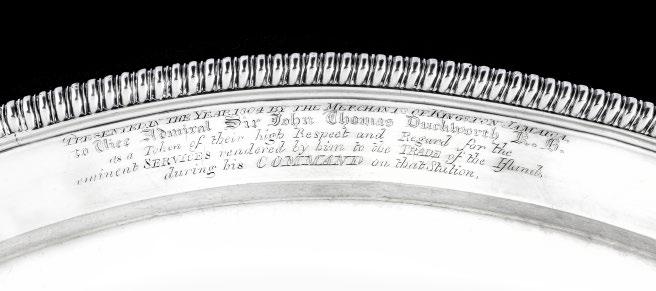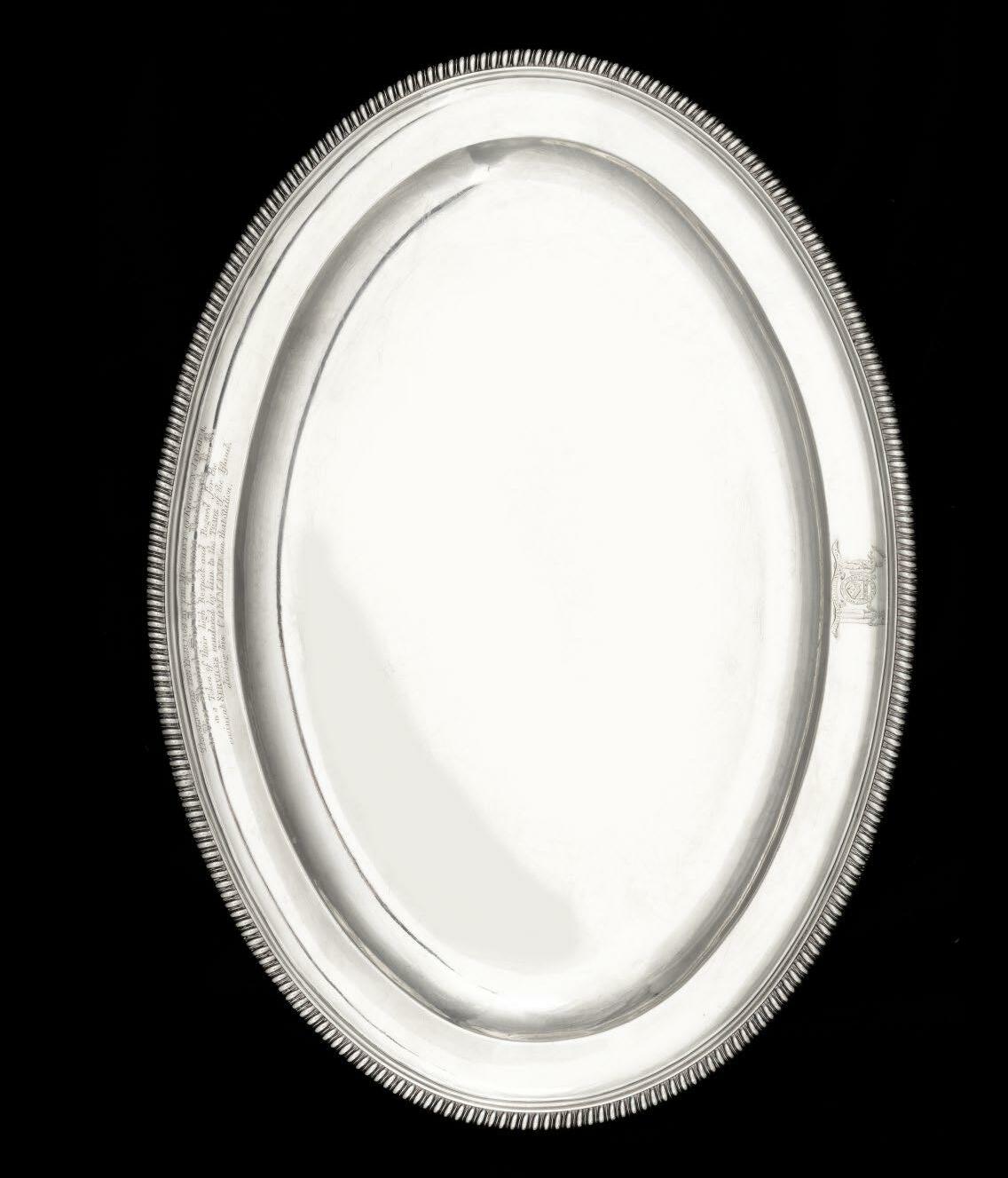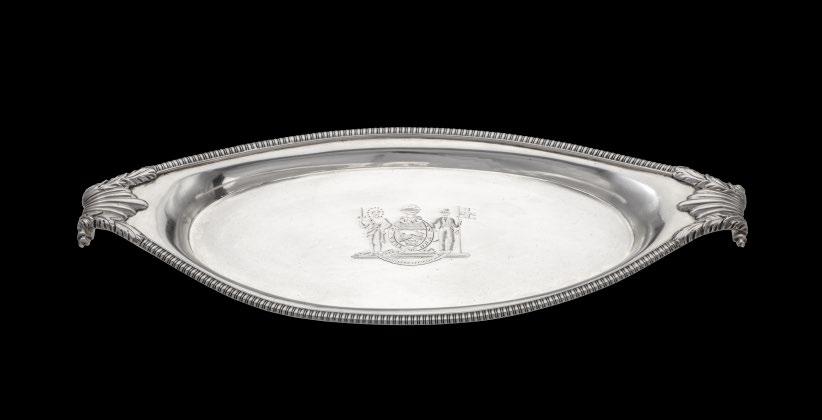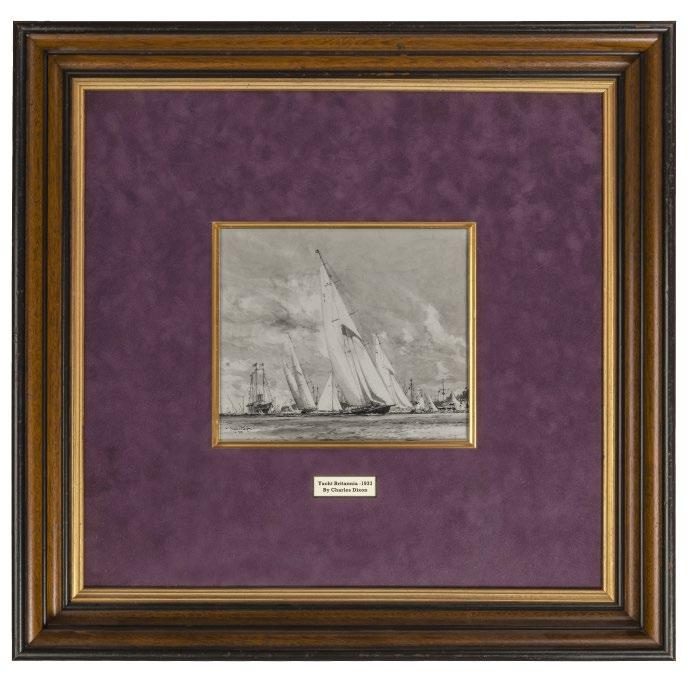
4 minute read
Admiral Duckworth’s silver salver and tray
44 The Admiral Duckworth silver
Length: 17in (43cm) Width: 12in (31in) Weight: 57 Troy ounces
Advertisement
This large oval silver dish has a gadrooned border engraved ‘Presented in the Year 1804 by the Merchants of Kingston, Jamaica, to thee Admiral Sir John Thomas Duckworth K.B. as a Token of their high Respect and Regard for the eminent SERVICES rendered by him to the TRADE of the Island, during his COMMAND on that Station’. Decorated opposite with the arms of Duckworth, within a garter and motto of the Order of the Bath Tria Juncta in Uno, the arms supported by a figure of Orion (the hunter) and a seaman, above the motto Disciplina Fide Perserverantia (discipline, faith, perseverance). Maker’s mark of W.S. for William Stroud, London 1805-06. Purchased with a gift of money from the merchants of Jamaica at the end of Duckworth’s posting as Commander-in-Chief at Kingston between 1803-1805. Jamaica’s wealth relied heavily on the Royal Navy for protection. During Duckworth’s tenure of command, he captured numerous enemy vessels, blockaded San Domingo and took 5,512 French troops prisoner. For these services he was presented with a gold mounted sword and a grant for the purchase of plate in London. His purchase included a silver tea kettle which, identically inscribed, dated and hallmarked, is now in the collection of the National Maritime Museum in Greenwich. John Thomas Duckworth (1748-1820) witnessed two fleet actions (Lagos and Quiberon Bay) before his twelfth birthday. He passed for lieutenant in 1766 and was thrice tried by court martial during his career. Returning from a cruise in Diamond, 32 guns, with her guns loaded, the ship was required to fire a salute. Duckworth had the shot removed from the guns, counted it and found the total correct. But one gun had been double shotted, and the remaining round killed five men in a nearby ship. The ensuing court martial acquitted Duckworth of neglect of duty and commended his counting the shot, but this did not satisfy Lord Howe, who reconvened the court to try Duckworth for murder, of which he was also acquitted. Howe intended the second trial to pre-empt any action in a civil court. Later, on the termination of his Jamaica command in 1805, he brought Acasta, 40 guns, into Plymouth with a prodigious cargo of merchandise, including mahogany for improvements to his home Wear House at Topsham, Devon. This led to his third court martial for the supposed contravention of at least two of the articles of war, but the court accepted his assurance that his imports were for personal use.


Length: 10 ½in (26.5cm)
Of ovoid form with gadrooned border and acanthus leaf handles, this spill tray is engraved to the centre with the arms and motto of Admiral Duckworth. Maker’s mark of Thomas Robins, London 1807. (Cont’d) Duckworth was awarded his first Naval Gold Medal for the Battle of ‘The Glorious First of June’ in 1794. He was made a Knight of the Bath in 1802 and promoted Vice-Admiral in April 1804 when he was selected to relieve Lord Northesk in the Mediterranean as third in command to Nelson. However, Duckworth missed Trafalgar, partly because of Admiralty dithering over his flagship and also because he was prepared to wait for his shipboard band, a quartet of fiddlers (see flute page 86). He relieved Collingwood off Cadiz on 15 November 1805, and within two weeks lifted the blockade in order to pursue a French force said to have quit Rochefort. He failed to find it, but while returning to his station on 24 December met a French squadron equal to his own. After thirty hours he called off the chase as only his flagship was in sight of the enemy. Like Nelson earlier in the year, Duckworth ran for water to the West Indies. On 1st February 1806 he learnt that a French force was off San Domingo. It comprised five ships of the line (including the 120-gun L’Imperial), two frigates, and a corvette; Duckworth had seven ships of the line and two frigates. He brought the French to action on 6 February, making the signal ‘This is glorious’ and ‘engage the enemy more closely’. Duckworth ordered a portrait of Nelson to be suspended from the mizzen stay of his flagship Superb, and with his fiddlers playing ‘God Save the King’ and ‘Nelson of the Nile’, bore down on the leading French ship Alexandre, 84 guns, and engaged her at close quarters. After a severe action of two hours, two of the French ships were driven ashore and burnt with three others captured. Only the French frigates escaped. Following Sir Richard Strachan’s victory (4 November 1805), this completed the Trafalgar campaign. It was also the last action for which the Naval Large Gold Medal was awarded.
Duckworth was elected to the Admiralty seat in parliament of New Romney in 1812 and on his return home in 1813 was created a baronet. In January 1815, after a period of unemployment, he became Port Admiral at Plymouth, which soon afterwards became a centre of attention with the visit by Bellerophon bearing Napoleon to his final exile. Duckworth refused to receive him officially but was nevertheless the last senior British officer to speak with the former emperor before he departed for St Helena in Northumberland.










